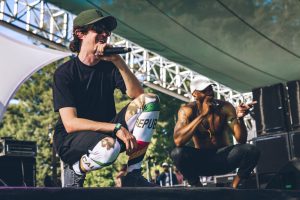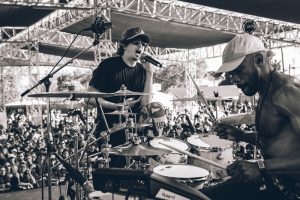Q&A: Watsky finds the beauty and the flaws in his family on next LP

Watsky
The phrase “Welcome to the Family” means different things to Bay Area-born poet-rapper-author George Watsky. He named a new song that, and his current tour after the song. When he started writing the song he was introducing his significant other to his family. By the time he finished, the relationship was over.
Watsky
Feed the Biirds
Chukwudi Hodge
9 p.m., Tuesday, Nov. 6
The Catalyst in Mountain View
Tickets: $18-$85.
The song, which will be on an as-yet-unfinished album he hopes to release in the winter, is bittersweet to Watsky, who now calls Los Angeles home.
“One of the things I really connected with that person over was what I felt like was missing from both of our lives; some shared trauma,” Watsky said recently in a call from the road.
The song ends with Watsky singing the same refrain over and over again: “You deserve love.”
“It’s a mantra I’m saying to that person and to myself, and this idea of using a relationship to fill up the missing spaces that you have where maybe you didn’t get love in other portions of your life. It’s this idea that every family is broken and whole at the same time.”
“But I think every family is a butterfly/ You know, pretty from afar, pretty gross up close/ Don’t pity what we are, it’s mostly un-hideous,” he raps.
Watsky has made waves since rising to the top of the Brave New Voices National Poetry Slam in 2006. The attention he received landed him an appearance o the final season of HBO’s Def Poetry. Since then he’s released four albums and in 2016 became a New York Times bestselling author. Earlier this year, he also reformed his high school band, Invisible Inc., which released a record and also toured. He said fans should expect more from that project in the future.
But first, he’s introducing his family to fans across the U.S.
RIFF: “Welcome to the Family” was your first new song in a couple of years. What’s the song’s driving force?
Watsky: The song serves a few purposes at once. It’s about a relationship that I had this past year and the idea of welcoming a new person into your family in a really literal way. But it’s also about trying to establish the values that I want to stand for as a musician. That’s one of the reasons I chose to name my tour that; welcoming people into this group that I’ve been lucky to cultivate over the years. This tour, everybody on the bill comes from within our touring group. … The two acts on the opening bill come from inside my own band that I’ve been playing with for a few years now. It’s all of those things. Then, the video adds a new layer to it, where I’m sort of wrestling with the idea of what it means to cultivate this sort of family in the context of being a musician—trying to be this charismatic public figure these days and the way in which that sometimes makes me uncomfortable. It reminds me of what a cult leader does to try and attract an audience.
That would make you like the patriarch of your family, right?
Watsky: Well, I guess that’s the part about it that makes me uncomfortable; that I wrestle with. I consider myself a socialist. At the same time, I suppose there is a certain leadership structure, and it’s my name on the bill at the end of the night. But I do try to empower the people I’m playing with as much as possible. The biggest difference is there is an open door. I only want people to be part of this group, this operation, as long as it makes sense for their lives. Musicians come and go. In a best-case scenario for me, my group could be a stepping stone for somebody else to get to where they want to get, and everybody who’s in my band [is] fully capable and talented enough to be frontpeople on their own. I hope that’s what they get if that’s what they want to do.
Following the first single, you released “All Like Whatever.” How does that add to the narrative? The name implies indifference, but that’s kind of a guise, right?
Watsky: “All Like Whatever” is not quite about indifference; it’s about feigned indifference. It’s about how these days, in modern America, and probably many other countries and parts of the world, too, there’s so much of an ability to hide; to not put ourselves out there for fear of being rejected. “All Like Whatever” is about being passionately in love with somebody but being afraid to present that in a raw, unvarnished way, so it’s actually a song about hidden obsession.
What else are you writing about these days? I heard you’re working on a song about explaining white privilege. The last time a white rapper tried to do that, it didn’t work out so well.
Watsky: That [song is] not for my upcoming album. That’s just an angle that I’m working on exploring in my writing. Something that I’m interested in doing is unpacking my family history, like, “How did I get to where I’m at?” It’s been something I’ve done in previous work, too. For instance, I have a song called, “Hercules,” where I basically trace the money that trickled down through four generations of my family history and eventually paid for my college education. So it’s not like on the nose in one specific way. I’m trying to explain white privilege in three minutes, or something like that. But it’s something that plays a factor in a lot of my songs—just trying to have a general awareness of my privilege, of the ways that I’m lucky, and the ways I got to skip the line and … got opportunities that other people might not have gotten and just not taking that for granted. My personal history plays a part in the larger context that I fit into. With that being said, a lot of my upcoming material is relationship-based, love-based; trying to counteract what I see as toxic energy coming from positions of power in our country and the presidency, and saying, “OK, what do I see as the antidote for that energy?” I think it’s compassion; I think it’s vulnerability and love, and that’s what I want to explore.
In 2016, you released a collection of essays called How to Ruin Everything, and it became a New York Times bestselling author. How did that feel?
Watsky: It’s awesome. I’m really, really happy with how the book did. I was nervous to write an essay collection because it was a new step, but I was really happy with how it was received. I’ve gotten a lot of positive feedback from people, and it’s given me a lot of confidence to try and do more prose writing in the future.
I had a lot of stories and things I wanted to write about, but it didn’t fit in the form of a song or a poem. The opportunity came along for me to do a book, and writing an observational humor nonfiction book made the most sense to me at the time because my poetry and my music is so autobiographical. I’d never written a big project in prose before. I ultimately would love to be a novelist. That’s what I want to do next, but I thought it would be a great sort of in-between step. Writing a novel could prove I could write prose.
What kind? Historical fiction; sci-fi; something else?
Watsky: I have an idea that’s kind of a combination of both. It’s got like sci-fi, magical, realism elements to it but is grounded in reality in the era of San Francisco that I grew up in. I’m trying to write about what I know. I’m writing about an epileptic protagonist. I have epilepsy, and I think that’s a perspective I have that not everybody has and something people might be interested to hear about.
You’re still involved in the Brave New Voices National Poetry Slam, win which you got your start. I heard that last summer you mentored young poets. What does that entail?
Watsky: It makes sense as a place to pay it forward because that’s where I got my start. So it’s just like this obvious cycle to me. I was mentored by poets who were older than me. I have a chance to go back, and I love the community. I think it’s this amazing convergence of kids from all over the country who are discovering not only their love for language and being on stage and for poetry, and for sharing it in this way for the first time, but also finding, for the first time, this community of other kids who feel just as passionate as they do. Those are relationships that are very, very powerful, that last a lifetime, and that have lasted a lifetime for me in terms of the people I met when I was that age. What it looks like could be any number of things. I showed up, and I was there for the five days for the festival, and sometimes it means leading writing workshops. I host events. I’ll literally be the emcee for the Poetry Slam for some of the rounds, making myself generally available to answer questions for kids, doing organizational work.
Follow editor Roman Gokhman at Twitter.com/RomiTheWriter.


